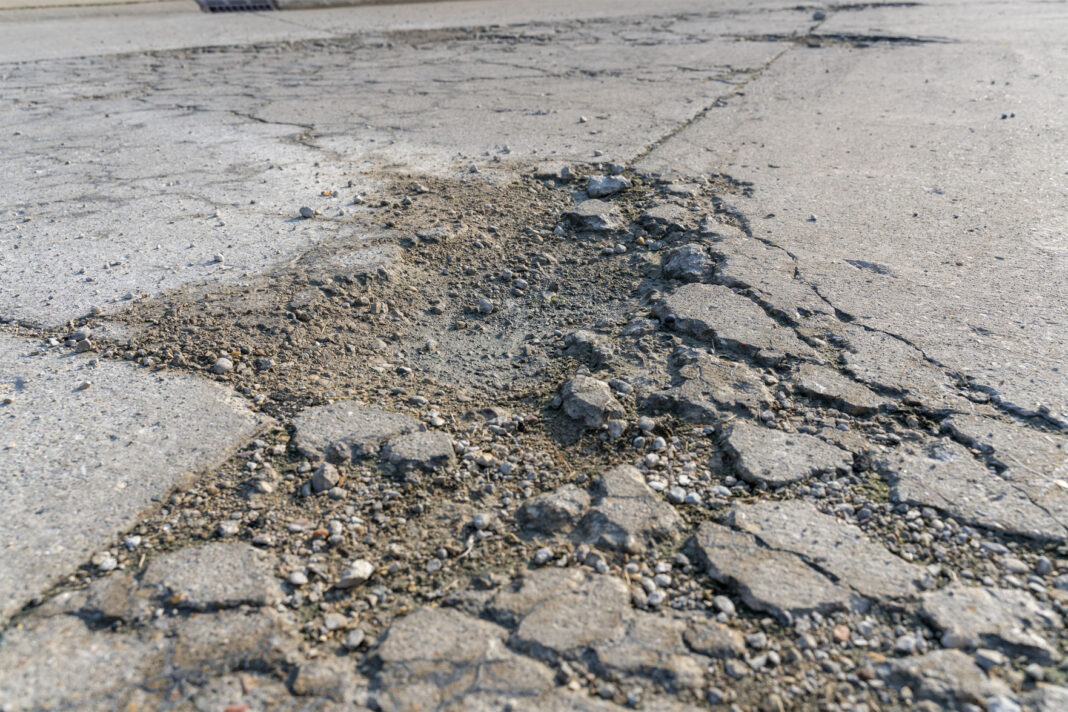For the third time in three years, homeowners in a White River Township subdivision are asking county officials to do something about severely crumbling concrete streets in their neighborhood.
Concrete streets in Willow Lakes, a neighborhood built in the 1980s and 90s located northwest of State Road 135 and Stones Crossing Road, have been a problem for at least two decades, but have gotten progressively worse in the last 10 years, long-time residents say.
Those long-time residents and homeowners association members are again advocating for their neighbors. They have watched as nearby subdivisions underwent routine maintenance on asphalt streets, while their concrete streets are patched and patched with no real fix in sight, said Dan Ryan, president of the Willow Lakes homeowners association.
The streets have degraded to the point that, in some areas of the neighborhood, chunks of concrete fly up when heavy trucks or speeding vehicles roll through, said Dan Cecil, a Willow Lakes resident. A child in the neighborhood hit a patch of damaged concrete that caused him to lose control of his bicycle, crash and sustain several injuries, he said.
“This is the kind of stuff we fear,” Cecil said.
Some of their advocacy paid off. The county received funding to fix some streets in the neighborhood through a Community Crossings grant earmarked for projects this year, but has yet to begin work because the project had to be re-bid, county officials told the neighbors. But it’s not a long-term fix.
Ryan, Cecil and others from the neighborhood attended the Johnson County Board of Commissioners meeting Monday to bring the issue back to the forefront.
On behalf of the neighborhood, which has about 130 homes and hundreds of residents, Ryan asked four pointed questions for some clarity on how their streets will be fixed in the short- and long-term.
The residents brought visual aids, including fist-size chunks of concrete to demonstrate the issue, and emailed photos to the board. During the meeting, the chunks sat beside Commissioner Ron West’s name plate. West represents the northern third of the county, including Willow Lakes residents.
Though there is a fix on the table for many of the worst streets in the subdivision, they are concerned the fix is temporary. The project includes milling the top of the concrete streets and putting down an asphalt overlay.
The commissioners last month approved the Johnson County Highway Department’s request to apply for funding to do the work on streets in Willow Lakes and 14 other White River Township neighborhoods with streets that need to be reconstructed in the next three years.
The fix would delay further decay of the streets and buy the county time to get funding to repair all of the concrete streets that are reaching a breaking point at the same time.
To reconstruct all the streets that need work in the next five years, the county would need $22 million, according to highway department estimates. To fix all the streets that need to be reconstructed immediately, they would need $9 million, estimates show.
In contrast, milling and overlaying streets that need reconstructed in the next three years would cost about $2 million, with the county paying half if the Indiana Department of Transportation approves the project.
The trouble with the quick fix, residents say, is problems will persist under that layer of asphalt, and they will be left waiting for their streets to become treacherous again.
“The asphalt conversion is probably better than nothing. It will probably make this area look like $1 million dollars for a couple of weeks,” Cecil said. “But in reality, as you go through the winter … all these pieces move independently, and when they go, those cracks will shoot right through that asphalt. The best they are going to get is a couple years and then they’ll have to redo it.”
The residents wanted to know where the money is going to come from when the newness wears off, and said they feel ignored and left out. Other neighborhoods get work done while they continue to pay taxes that aren’t going toward permanently fixing their streets.
“We’ve paid a lot of property taxes in the past 33 years. I know our property taxes don’t pay for roads … but it does go to pay you guys,” Ryan said. “They’ve resealed Brockton Manor a couple of times in the past 10 years. I know it doesn’t take as much to do that as replacing a street, but it is not free. We just sit there and sit there as things continue to get worse.”
West said the commissioners are looking at two main options — a bond and matching grant opportunities — that would help the county accomplish more work for less money.
Both options will take time, so West didn’t have a timeline on when a long-term fix might be delivered. Given that there are so many neighborhoods that need work, the issue is complicated, he said.
“As you know, the government moves slowly, but we are working toward it. I wish I had an answer today that could send you away with smiles on your face and an understanding that certain things are going to happen in a timely fashion, but I really don’t have that answer,” West said. “The only thing I can tell you is the three of us are acutely aware of your situation and the other homeowners up in that area.”





